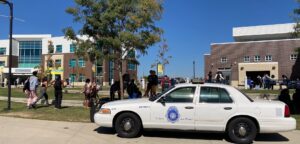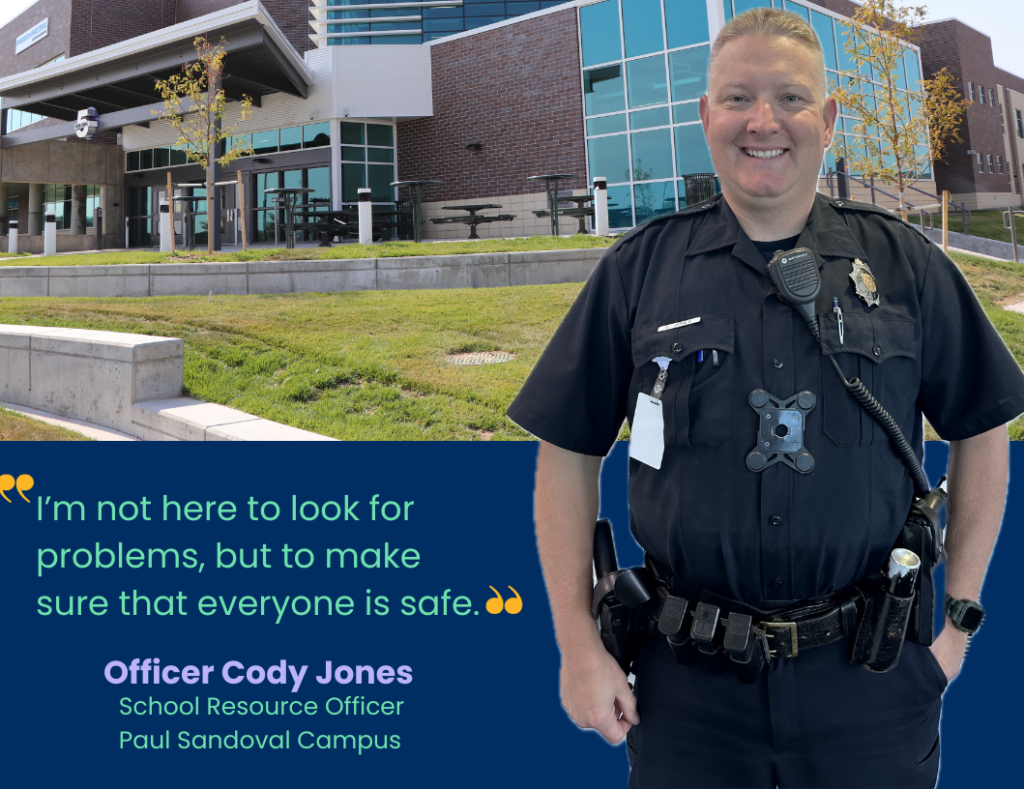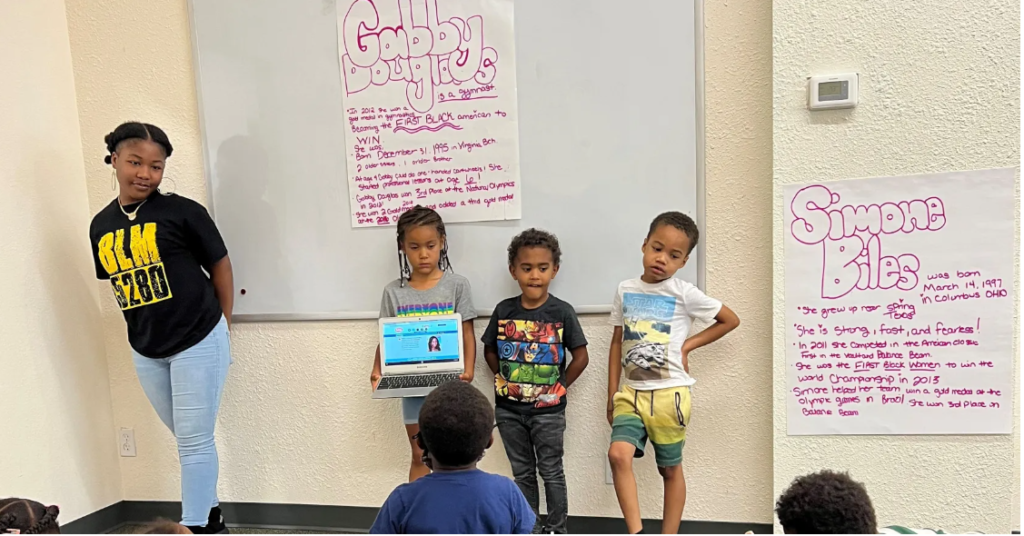Photo: Denver Police Department School Resource Officer, Cody Jones, who patrols Central Park’s Paul Sandoval Campus that’s home to Northfield and DSST-Conservatory Green High Schools. Photo courtesy of Northfield High School.
Police officer Cody Jones uses his “dad eyes” when walking Central Park’s Paul Sandoval Campus, home to about 3,000 students and staff members from Northfield High School and DSST: Conservatory Green High School.
Jones volunteered for the post of school resource officer (SRO) at Northfield and DSST: CG out of his love for kids, starting with his own.
“I’m a father of four, with twins in high school,” he says. “I want parents to rest-assured that there is a safety presence at school. That’s what I want for my kids and how I approach the job every day.”
Jones is one of 14 armed Denver Police Department SROs assigned to the 13 larger high schools in Denver Public Schools. The DPS board voted to remove SROs from schools in 2020, but reversed the decision following two shootings at East High School last spring.

In addition to Officer Jones, Northfield is supported by three DPS campus safety officers (CSOs), five deans of culture, six student support liaisons and seven counselors. These numbers represent NHS’ multi-layered approach to safety, says Northfield Principal Jessica Rodriguez Bracey.
“Safety at Northfield is about much more than physical safety,’’ she says. “It includes mental and social-emotional safety as well. Physical safety is visible with the eyes; emotional and mental safety is ensured by the relationships we build with students.”
That varied approach is reflected in how the police department defines the job of SROs. They are tasked with three distinct roles: law enforcement officer, public safety educator and informal counselor.
“I’m not here to look for problems, but to make sure that everyone is safe,” Jones says. “I approach the position as a parent, asking as things come up, ‘How would I want this handled?’ ”
He takes the right approach being, “unbelievably calm,” says NHS communications specialist April Slater, and “quick to make connections with students.”
To that end, Jones spends much of each school day traipsing between the five buildings on campus, opening doors for students and greeting everyone he sees with a smile and a gentle “hello.”
Jones, who has coached his children’s sports teams for years, has jumped into a game of pick-up football with DSST students on the quad, and he regularly welcomes students and staff into his Northfield office for a friendly conversation.
“We want students to know that, yes, he’s here in a uniform, and he’s a mentor and informal counselor,” Slater says. “He’s another caring adult and another set of eyes for safety.”
Jones parks a police car outside the cafeteria most mornings, and even as he’s asking students about their weekend or slinging a football, he is scanning the grounds, always mindful of safety concerns.
To meet students, Jones has also been making the rounds between school clubs and affinity groups, including the Black Student Alliance, La Raza, Students Demand Action and the Jewish Student Alliance.
Over a pizza lunch with members of the NHS Student Council last month, Jones introduced himself as “a dad and a high school baseball player.”
He shared how he played sports in college before “realizing going pro wasn’t in the future” and enlisted in the Army. Students laughed when Jones admitted he turned to law enforcement after learning that his post-Army dream of becoming a firefighter would require a math test.
During the lunch, freshman Stella Biblis asked, “Really, what is an SRO?” Jones explained that he served as a patrol officer for 13 years until receiving accreditation as a “school police officer” by the National Association of School Resource Officers. Students nodded along as Jones added that the 40-hour training program covers juvenile brain development and communication skills as well as public safety education and case law.
Biblis says it “felt kind of scary” when she first spotted a police officer on campus. “Later I realized he made me feel safer,” she says. “He was someone I could rely on to protect me.”
For sophomore Camila Rojas-Gonzalez, “it doesn’t feel fair that we need to grow up with a police person on campus.” Yet, she says, “I feel relief and sadness because at the same time something could happen.”
When not making the rounds on campus, Jones pops into local businesses to ensure that students who have permission to eat lunch off-campus are “representing the school well,” he says. He often does a hasty circuit between campus and a nearby park to herd young people back to class before the bell rings.
“Traffic is another thing on my radar,” he says. He aims to educate, rather than writing violations. “We make sure students are following the rules to park in the neighborhood, and we are looking to prevent accidents,” he says.
DPD’s Alternative to Citation program gives SROs the freedom to use discretion with low-level offenses.
“The goal is to identify kiddos who don’t necessarily need a ticket but may be struggling with something as simple as rent assistance, to pay heating and cooling bills or for school clothes, counseling or mentorship,” Jones says.
Safety measures at Northfield include IDs worn by students and staff, frequent door checks, passes for campus visitors, security cameras, an instructional lead team that shares culturally responsive strategies and intentional techniques for creating a welcoming environment.
“We routinely leverage the expertise of counselors, social workers and the school psychologist,” Principal Rodriguez-Bracey says.
As for Northfield’s relationship with their SRO, Rodriguez Bracey says, “I’ve established a partnership with him to ensure we’re not issuing citations but rather developing relationships, offering mentorship where possible and more.”
Northfield’s three DPS campus safety officers assist with school rule enforcement and are critical to deescalating a situation before it would require legal intervention. CSO Gil Velasquez says he spends his days, like Jones, walking the campus and scanning for safety concerns. He verifies that doors are secured and that campus visitors are properly checked in.
“I love the fact that at any given moment, I can be the person who may make a difference in a child’s life,” says Velasquez, who has been serving with DPS for 25 years. His wife is a paraprofessional at Northfield, and his daughter is the school librarian.
“They are helpers,” Slater says. “They care about the entire community.”
In May, DPS surveyed students, parents and the broader community to gauge their attitudes toward police on campus. Some critics argue they can contribute to the so-called “school-to-prison pipeline’’ which the American Civil Liberties Union describes as a process “wherein children are funneled out of public schools and into the juvenile and criminal justice systems. Many of these children have learning disabilities or histories of poverty, abuse or neglect, and would benefit from additional educational and counseling services. Instead, they are isolated, punished and pushed out.”
But that was not the general view from the survey. “The response was generally positive,” Slater says.
“What’s important is that students know Officer Jones is here for them and for their safety.’’
That’s exactly why Jones volunteered for the position.
“I became a police officer to help people,” he says. “It’s a good feeling knowing that you can impact someone’s life.”




